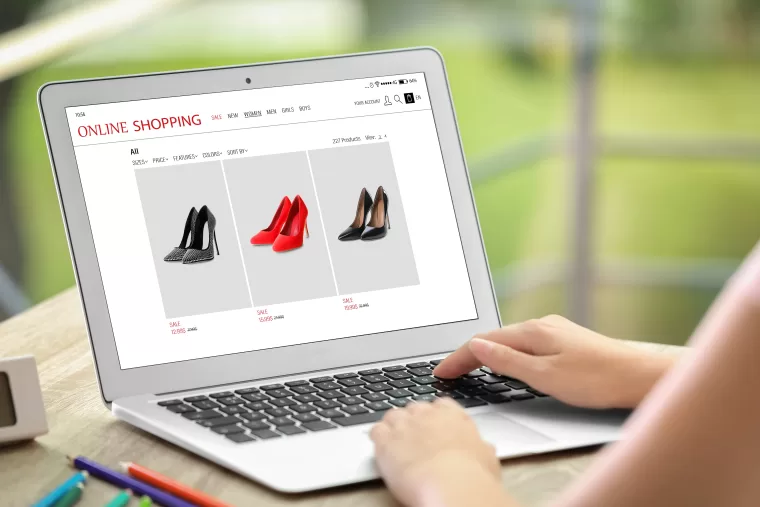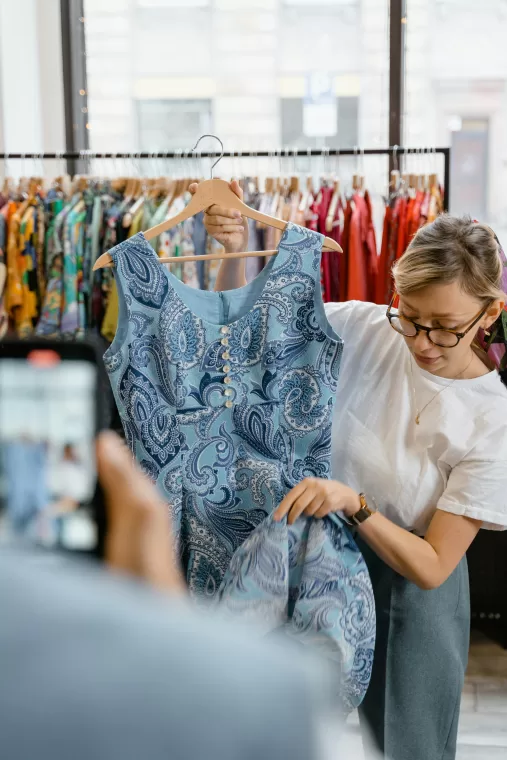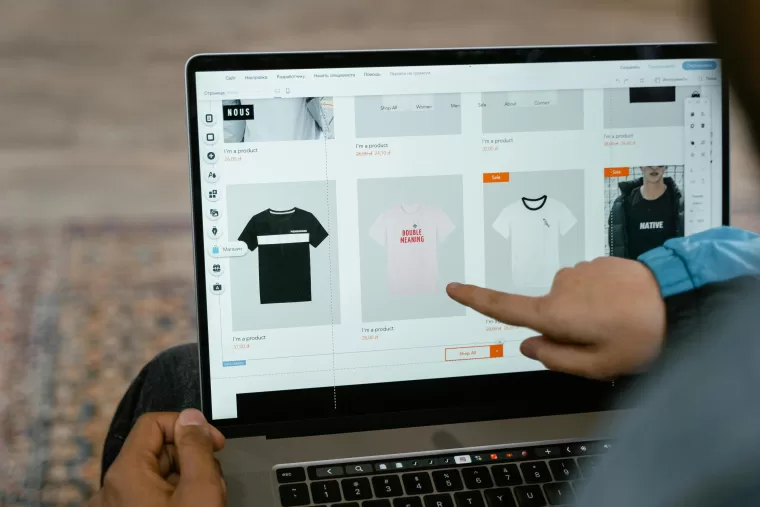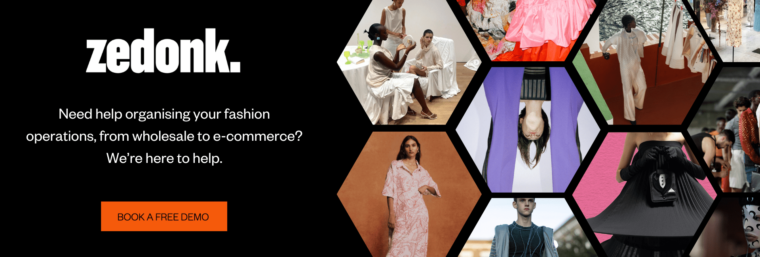It’s no secret that how we buy and create things is changing, and the world of luxury retail fashion has been particularly affected, especially luxury fashion e-commerce. The digital realm has become an indispensable business frontier for high-end fashion brands. As consumer preferences and culture shifts and technology advances, having a dedicated e-commerce platform is no longer optional. It’s a crucial strategy for maintaining market relevance, brand integrity, and financial growth.
This article explores why modern luxury fashion brands need their own e-commerce shops and how they can leverage luxury e-commerce trends and technology, like a dedicated ERP system, to deliver exceptional online experiences.

The Rise of Luxury Fashion E-commerce and Recent Trends
The luxury fashion industry has undergone a significant digital transformation in recent years. According to Bain & Company, online sales of personal luxury goods surged by 50% in 2020, reaching €49 billion. This growth trajectory is expected to continue for luxury e-commerce trends, with online channels projected to represent up to 30% of the luxury market by 2025. McKinsey & Company also reports that online sales of luxury goods grew by 22% in 2021, reinforcing the upward luxury e-commerce trends.
In recent years, several trends have driven the expansion of luxury fashion e-commerce. Millennials and Gen Z consumers, who prioritise experiences and digital interactions, are significantly influencing the market. Globalisation has opened new markets, while the convenience of online shopping continues to attract high-end buyers. Additionally, the COVID-19 pandemic accelerated the shift towards digital platforms, making an online presence imperative for luxury brands.
However, the transition to e-commerce hasn’t been without challenges. Initial concerns included brand dilution and the proliferation of counterfeit goods. Many luxury brands were hesitant to sell online, fearing that it would diminish their exclusivity and allure. Successful brands overcame these challenges by leveraging technology and maintaining exclusivity. By integrating advanced security measures and offering unique online experiences, they preserved their brand integrity while reaching a broader audience.
Benefits of a Brand-Owned E-commerce Shop
Innovative technologies and strategic approaches have enabled high-end labels to overcome these challenges by leveraging their exclusivity and technology, to create online experiences that rival or even surpass in-store interactions. For luxury fashion houses, establishing a proprietary e-commerce platform offers many advantages:
Complete Control Over Brand Experience – Owning the e-commerce channel allows brands to meticulously craft every aspect of the digital customer journey. From stunning visuals to compelling storytelling, brands can ensure their online presence aligns perfectly with their luxury positioning.
Exclusive Product Offerings – Brand-owned platforms enable the creation of online-exclusive collections or limited-edition drops, fostering a sense of exclusivity and urgency among discerning customers.
Direct Customer Insights – By managing their own e-commerce operations, luxury brands gain invaluable first-party data on customer preferences, shopping behaviours, and trends. This information is crucial for informed decision-making in product development, marketing, and inventory management.
Enhanced Profit Margins – Eliminating third-party retailer commissions and fees allows brands to capture a larger share of the revenue generated from online sales.
Seamless Integration with Fashion ERP Systems – A brand-owned e-commerce platform can be seamlessly integrated with a comprehensive fashion ERP (Enterprise Resource Planning) system. This integration enables real-time inventory management, streamlined order fulfilment, and data-driven decision-making across the entire value chain.

Essential Features for Luxury E-commerce
To create a truly luxurious online shopping experience, brands must incorporate several key elements into their luxury fashion e-commerce platforms:
Elevated Design and UX – The digital storefront should reflect the brand’s premium positioning through sophisticated design, high-quality imagery, and intuitive navigation. Every interaction should evoke the same sense of luxury as walking into a physical boutique.
Robust Security Measures – Protecting both the brand’s reputation and customer data is paramount. Implementing state-of-the-art security protocols and anti-counterfeit measures helps build trust and safeguard the brand’s integrity.
Personalised Shopping Journeys – Leveraging AI and machine learning, luxury e-commerce sites can offer tailored product recommendations, virtual styling assistance, and customised content based on individual customer preferences and browsing history.
Flexible Payment and Fulfilment Options – Catering to a global clientele requires offering diverse payment methods and shipping options. From cryptocurrency to buy-now-pay-later services, and from same-day delivery to white-glove concierge services, flexibility is key in luxury e-commerce.
Exclusive Loyalty Programs – Implementing tiered loyalty programs with exclusive perks, early access to new collections, and personalised experiences helps foster long-term customer relationships and encourages repeat purchases.

Operational Excellence Through Fashion ERP
To be able to provide the exclusivity, personalised service and unique offerings expected of a high-end fashion brand, everything needs to run like clockwork. Fashion ERP software plays a vital role in integrating the entire value chain, from design and production to sales and fulfilment. A brand can achieve this excellence via an ERP in the following ways:
- Streamlined Processes from Design to Delivery. A fashion ERP system streamlines processes across the entire value chain. It integrates design, manufacturing, inventory management, and fulfilment, ensuring that every stage operates efficiently and cohesively.
- Real-Time Inventory Management Solutions. Real-time inventory visibility is crucial for managing stock levels, preventing overstocking or stockouts, and ensuring that products are available when customers want them. An ERP system provides accurate and up-to-date information on inventory status, enabling better decision-making and customer satisfaction.
- Accelerated Order Fulfilment. Efficient order fulfilment is essential for meeting customer expectations. A fashion ERP system automates and accelerates the fulfilment process, from order placement to delivery. This ensures that orders are processed quickly and accurately, reducing lead times and enhancing customer satisfaction.
Success Stories in Luxury E-commerce
Several well-known luxury and high-end fashion brands have successfully leveraged e-commerce and ERP integration to enhance their digital presence.
A famous British luxury brand was an early adopter of digital innovation, implementing a comprehensive omnichannel strategy supported by a strong ERP system. This approach has enabled them to offer seamless experiences across online and offline channels, contributing significantly to its digital revenue growth.
One of Italy’s most recognisable fashion houses has excelled in creating immersive online experiences, including virtual try-ons and exclusive digital-only products. Their integration of its e-commerce platform with its ERP system has allowed for efficient inventory management and personalised marketing initiatives.
An iconic French flagship brand has invested heavily in its digital infrastructure, including a state-of-the-art ERP system that supports its global e-commerce operations. This has enabled their parent company to maintain its premium positioning while expanding its online reach.

Embracing the Digital Future of Luxury
With all this change, we can see that having their own e-commerce shop is essential for luxury fashion brands in today’s economic climate. To maintain control over the brand experience, offer exclusive products, gain valuable customer insights, and maximise profits by eliminating third-party costs, integrating a fashion ERP system is critical for brands to reach operational excellence. It ensures streamlined processes, real-time inventory visibility, and efficient order fulfilment. By embracing these strategies, luxury fashion brands can deliver the exceptional service and unique experiences that their discerning customers expect, solidifying their position in the competitive luxury fashion e-commerce market.
Brands that invest in these digital capabilities and also maintain operational excellence through utilising integrated ERP for the fashion industry, will be well-positioned to thrive in the increasingly digital future of luxury retail. With years of experience, 1000s of trusted brands and showrooms all over the globe, ask us how Zedonk can usher your brand towards even more excellence.


